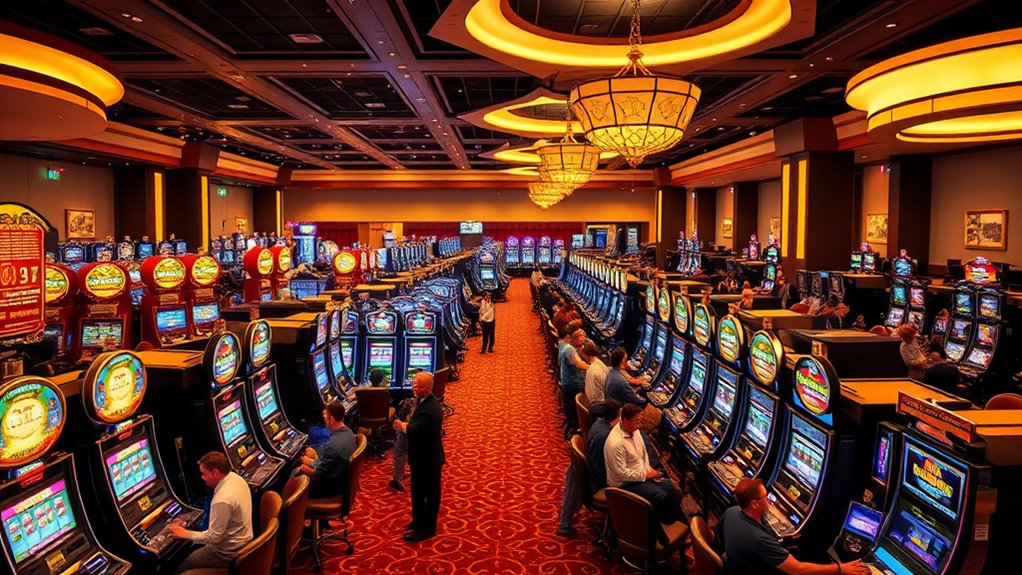Apr 10, 2025
The Economic Impact of Gambling Legislation: Jobs and Revenue
You’ll see the economic benefits of gambling legislation mainly through its job creation potential and significant revenue streams. New casinos create job openings during construction and operations, contributing to workforce development and skill acquisition. Gaming taxes generate substantial revenue for governments, reaching millions of dollars. As you explore the impact of gambling legislation, you’ll uncover a complex relationship between economic growth, social costs, and regulation, revealing the need for a balanced approach.
Gambling legislation can have a significant impact on job creation and government revenue. Understanding the economic consequences of different regulatory models, including those that impact the migliori casino non aams (best non-AAMS casinos), is crucial for informed policy debates. Delve into the economics with Fantabettiamo.

Assessing the Job Creation Potential of Gambling Legislation
Studies indicate that the expansion of gambling through legislation creates a ripple effect in the job market. As you analyze the data, you find that the introduction of new casinos and gaming facilities leads to an increase in job openings, both during the construction phase and in the long-term operations.
You notice that this surge in employment opportunities contributes to workforce development, as workers acquire new skills and training. However, you also consider the issue of job sustainability, as the industry’s volatility can lead to fluctuations in employment rates.
To accurately assess the job creation potential, you must weigh the benefits of short-term job growth against the potential risks to long-term job stability. By doing so, you gain a nuanced understanding of the impact of gambling legislation on local labor markets.
Revenue Streams Generated by the Gambling Industry
As you evaluate the broader economic implications of gambling legislation, a closer examination of the revenue streams generated by the industry is warranted.
You’ll find that the industry produces substantial revenue through gaming taxes, which are levied on the gross gaming revenue of operators. This tax revenue can be substantial, generating millions of dollars in annual income for governments.
In addition to gaming taxes, the industry also generates tourism revenue, as casinos and gaming establishments often attract visitors from outside the local area. This influx of tourists can lead to increased spending on accommodations, food, and other local goods and services, further boosting the local economy.
Economic Downsides of Increased Gambling Activity
While the revenue generated by the gambling industry can be substantial, you must also contemplate the economic downsides of increased gambling activity, which can have far-reaching consequences for individuals, communities, and the broader economy.
You’ll encounter significant social costs, including increased healthcare expenses, lost productivity, and strained social services. Addiction issues are a major concern, with approximately 1% to 3% of the adult population experiencing problem gambling behaviors. This can lead to financial difficulties, relationship problems, and mental health issues.
In addition, you’ll see a rise in crime rates, bankruptcy filings, and other negative economic outcomes. As you weigh the benefits of gambling revenue, it’s crucial to acknowledge these economic downsides and aim for a balanced approach that mitigates these negative consequences.
The Role of Regulation in Mitigating Negative Consequences
Effective regulation plays a vital role in minimizing the negative consequences associated with increased gambling activity.
You’ll want to prioritize regulatory compliance to verify that gambling operators adhere to strict guidelines and standards. This helps prevent money laundering, fraud, and other illicit activities. By promoting responsible gambling practices, you can reduce the risk of problem gambling and its associated social costs.
Data shows that well-regulated gambling markets tend to have lower rates of problem gambling and higher rates of revenue growth.
As you consider the economic impact of gambling legislation, it’s important to weigh the benefits of regulation against the potential costs and develop strategies that balance economic growth with social responsibility.
Case Studies of Gambling Legislation’s Economic Impact
How do the economic outcomes of gambling legislation vary across different jurisdictions?
You’ll find that case studies provide valuable insights into the impact of gambling laws on local economies. By analyzing data from various regions, you can identify trends and patterns that inform your understanding of the economic outcomes.
For instance, a study on the Nevada gaming industry reveals a significant correlation between gaming revenue and job creation. Conversely, a study on the Australian gaming market highlights the negative economic consequences of stringent regulations.
Through these case studies, you’ll gain a nuanced understanding of how different regulatory approaches shape the economic outcomes of gambling legislation, enabling you to make informed decisions about policy development.
More Details